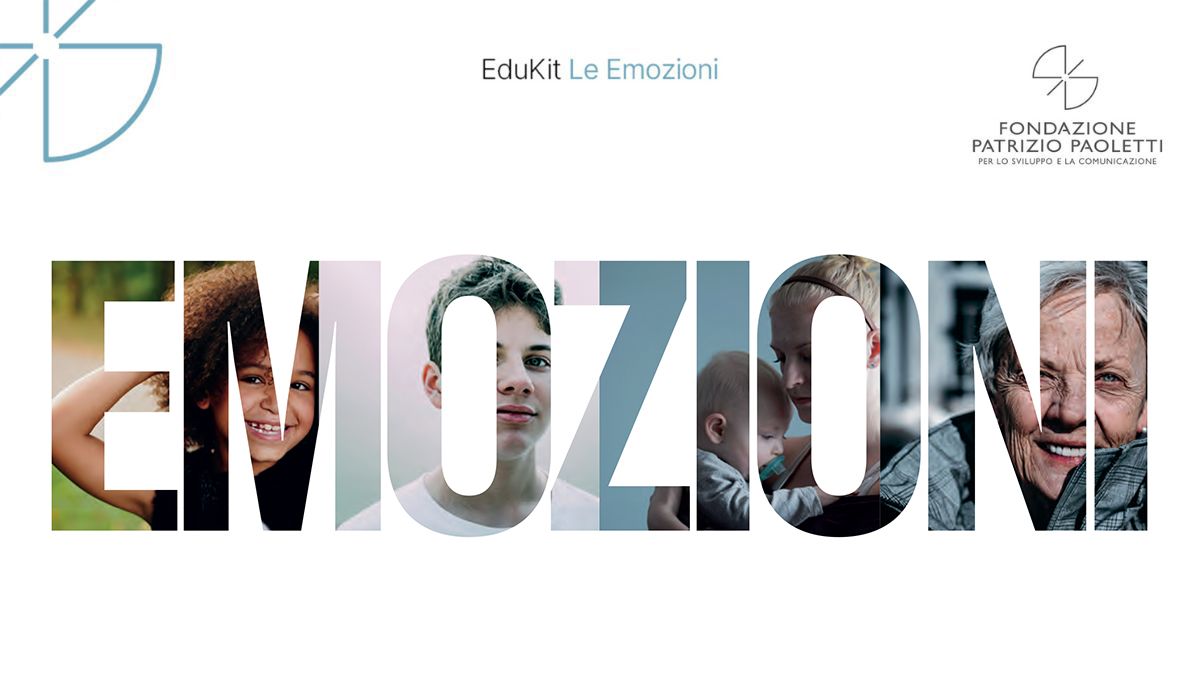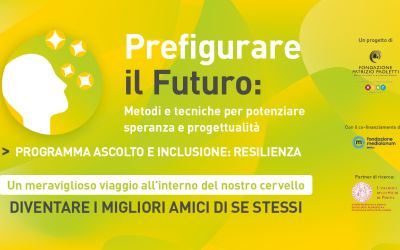
“To grow together”: the Patrizio Paoletti Foundation campaign
Counteracting emotional illiteracy
The lack of emotional skills at the social level is a phenomenon increasingly detailed by research, often cited today as a hidden cause of serious issues. It is believed to be the root of problems such as the adolescent mental health crisis and gender-based violence. The drastic changes in social interactions experienced in recent years have caught educators and policymakers unprepared, to the detriment of the younger generations. The new generations, who live in the era of the dominance of technology in daily communication, find themselves lacking suitable inner tools. This issue has significant repercussions in various areas of social and working life, with notable impacts on mental health and general well-being.
The hidden social costs of poor emotional competence
Regulatory efforts in Italy
The need for new educational tools
The importance for the labor market
Cinema that teaches emotions
A scientifically based emotional education program
The pedagogy of emotions: nominalization
Growing together: emotional training for different age groups
The decline of emotional intelligence among young people
A recent meta-analysis of 70 recent studies involving approximately 17,000 participants indicates a decline in emotional competencies among young and Western adults, especially in terms of well-being, self-control, and emotionality. These changes have been linked to the increasing use of social media, which often replace face-to-face interactions with online ones, reducing opportunities for emotional closeness and social bonding. For this reason, it is urgent to work on this not always visible root, renewing educational methods on a scientific basis and aiming for global healthWhat is the definition of health proposed by the WHO in 1948... More, of the body, emotions, and mind.The hidden social costs of poor emotional competence
La Crisi nella Salute Mentale degli Adolescenti: Aumento di Ansia e Depressione
The reduction in emotional intelligence has been associated in research with an increase in symptoms of anxiety and depression, as well as an increase in mood disorders, suicidal ideation, and suicide attempts. According to the Post-Pandemic Generation report by the National Youth Agency, when facing the future, Italian young people predominantly feel uncertainty (49%) and anxiety (30.5%), which in some cases turns into fear (14.6%) and pessimism (13.5%). These problems are again correlated with the challenges related to managing emotions in an increasingly digitalized world.Interpersonal Relationship Problems
Poor emotional competence limits individuals’ ability to establish and maintain satisfying relationships. Difficulties in expressing emotions appropriately and understanding those of others can lead to misunderstandings and conflicts, compromising both personal and professional relationships. This issue is well known in the psychopedagogical field and is linked to the concept of “nominalization.” A crucial phase in the development of emotional competence lies precisely in the ability to name what one feels and what others feel. Developing this competence requires specific training, with specific tools.
In Italy, the lack of emotional competence has recently been invoked in debates following gender violence episodes, including femicide. Several observers have noted that the inability to manage emotional relationships is the internal cause of such terrible events. This is especially true when considering the radical social transformation we are experiencing concerning gender roles, the reconfiguration of stable relationships, and the concept of family. All this in a globalized world where diversity is exponentially multiplied, requiring tools to decode it.
Regulatory efforts in Italy
It is important to remember that, precisely following a public debate after news episodes, at the beginning of 2022, Law 2782/22 was unanimously approved, regulating the “Provision on the experimental teaching of emotional intelligence education in schools of all levels”. In the text, the legislator reiterates that working in class on emotions and feelings serves to promote educational success; prevent educational poverty; combat early school leaving. The Italian regulatory orientation is in line with the international trend, which sees, for example, the establishment of a Ministry for Loneliness in both the United Kingdom and Japan. Similarly, the World Health Organization has established a commission to promote social connection. Promoting awareness, emotional literacy, and a network of healthy social relationships is a global health priority, with important social and economic implications.The need for new educational tools
To effectively address the growing emotional competence crisis, it is essential to develop targeted interventions to improve emotional intelligence through ongoing training and education. The lack of emotional competence must be understood within the broader framework of educational poverty that affects global health. Addressing these issues will not only improve individual mental health but also enhance social cohesion and work productivity.
ANXIETY How to Prevent and Manage it with Adolescents
Fill out the form
"*" indicates required fields
and watch the webinar now
The importance for the labor market
It is worth remembering that, according to the World Economic Forum, emotional intelligence is among the 10 most sought-after skills at least until 2025. According to statistics, people with high emotional intelligence earn an average of $29,000 more per year than those with low emotional intelligence. Moreover, each point increase in emotional intelligence adds about $1,300 to the annual salary.Cinema that teaches emotions
Cinema can also participate in emotional literacy, for example with the sequel to the animated film Inside Out, produced by Pixar in 2015 and awarded an Oscar. In Italy, too, from June 19, 2024, the adventures of the emotions of the protagonist Riley, a teenager facing the challenge of growing up, return to the big screen. Inside Out is a worldwide success, becoming the highest-grossing animated film of all time, with a record of one billion dollars, testifying to the great interest in emotional awareness.The production was supported by a team of psychologists who helped the authors introduce the audience to a fantastic and educational journey through adolescent emotions. The first film presented the headquarters of the emotion characters Joy, Sadness, Anger, Fear, and Disgust. Inside Out 2 introduces four new protagonists: Embarrassment, Envy, Ennui (existential boredom), and, most importantly, Anxiety. The film testifies to the important spread of anxiety among adolescents, to which Fondazione Patrizio Paoletti dedicates a free video lesson.
A scientifically based emotion education program
Fondazione Patrizio Paoletti, with its multidisciplinary research institute RINED, has been committed to education for global health for nearly a quarter of a century. The organization has also been active for several years in participating in European Union projects aimed at developing teaching methods for emotional intelligence to be implemented in schools.The model operated by the Foundation, Pedagogy for the Third Millennium, conceived by Patrizio Paoletti and his neuro-psychopedagogical team, promotes an educational approach that involves the four fundamental components of the human being, physical, emotional, mental, and spiritual. Such a 360-degree approach reflects the most recent understandings of the brain as a partially modular structure, composed of different areas and abilities to be optimally integrated. In this context, the development of emotional intelligence is crucial because emotions are the bridge between the body and the mind, and only correct emotional health allows the overall well-being.
The pedagogy of emotions: nominalization
Within the framework of Pedagogy for the Third Millennium, a multidisciplinary methodology is applied, based on neuroscientific discoveries. According to these disciplines, the first fundamental step to developing emotional competence is the process called “nominalization,” which is the ability to recognize one’s own and others’ emotions with their typical characteristics. Research has shown that each emotion is associated with specific cognitive components, a certain physiological activation, and precise micro-modifications that we can perceive in ourselves and read on others’ faces.Growing together: emotional training for different age groups
The commitment of Fondazione Patrizio Paoletti this year includes a series of four webinars paired with as many EduKits, one for each age group: childhood, adolescenceWhat is meant by adolescence? Adolescence is understood as t... More, adulthood, and old age. The 4 webinars will be released in close proximity to significant international anniversaries, such as World Parents’ Day, Alzheimer’s Day, Mental Health Day, and Children’s and Adolescents’ Rights Day. The content will be published between June and November 2024. Simultaneously, 4 EduKits with exercises, each dedicated to an age group, will be released for free, with special focuses on the daily life of relational units. Each EduKit will offer a guide to common relational situations between parents and children, adolescents, couples, and the elderly, providing concrete and specific tools for emotional awareness and management.To multiply the tools for the rapid learning of emotional competence, Fondazione Patrizio Paoletti dedicates a new area of its multimedia Glossary to emotional intelligence. Starting from June 2024, the Glossary will allow users to discover and deepen an increasing number of emotions, focusing on different cognitive components, physiological activation, hedonic tones, and involved motivational systems. To promote a scientific and practical inner look at our emotional world.
You can download the first free Edukit on the emotions of parenting here
- Paoletti, P. (2019). L’intelligenza del cuore. Comprendere le emozioni per realizzare i nostri sogni. Rizzoli
- https://www.gov.uk/government/news/loneliness-minister-its-more-important-than-ever-to-take-action.
- https://agenziagioventu.gov.it/generazione-post-pandemia/
- https://www.who.int/groups/commission-on-social-connection.
- Photo by Fondazione Patrizio Paoletti.
Be part of the change. Responsibly sharing content is an act of sustainability.
Let's train emotional intelligence: what emotion does this article arouse in you?





